Microstructure of Dolostones of Different Geological Ages and Dedolomitization Reaction
Abstract
:1. Introduction
2. Materials and Methods
2.1. Raw Materials
Rocks
2.2. Methods
2.2.1. Ordering Degree of Dolomite
2.2.2. Thin Section Petrography
2.2.3. Dedolomitization Reaction
2.2.4. Microstructure of Dedolomitization Reaction Products
3. Results
3.1. Analysis of Morphology and Distribution Characteristics of Dolomites
3.2. The Ordering Degree of Dolomite
3.3. The Degree of Dedolomitization Reaction
3.4. Influence of Ordering Degree of Dolomite on Degree of Dedolomitization Reaction
3.5. Microscopic Analysis of Products after Dedolomitization
4. Discussion
5. Conclusions
- The ordering degree of dolomite crystals in Devonian rocks is the highest, which is 0.83. The ordering degree of dolomite crystals in Jixianian, Cambrian, and Ordovician rocks is about 0.75. The ordering degree of dolomite crystals in Triassic rocks is the lowest, which is 0.61. The MgCO3 mole fraction of dolomite crystals in the test rocks ranges from 0.4717 to 0.4960. With the increase in the MgCO3 mole fraction, the ordering degree of dolomite increases, and the relationship between the MgCO3 mole fraction and the ordering degree is approximately linear.
- After curing in a 1 mol/L NaOH solution at 80 °C, the dedolomitization reaction rate of dolomite in 0.045–0.080 mm Triassic rock powders is the fastest, and the dolomite completely reacts at 7 days. The dedolomitization rate in the Jixianian rock powder sample is the slowest, and the dedolomitization reaction degree reaches about 40% at 7 days, and then hardly changes. The dedolomitization reaction degree of the dolomite in the Cambrian rock powder sample reaches about 50% at 10 d and then tends to be stable. The dedolomitization reaction rates of powder samples in Ordovician and Devonian rocks are similar, and the dolomites in the rocks can fully react after 10 days and 14 days, respectively. Therefore, it can be inferred that the older the geological age of rocks, the slower the dedolomitization reaction rate, and the lower the degree of dedolomitization reaction.
- The effects of the ordering degree of dolomites on the degree of dedolomitization reaction in different dolostones are analyzed. The lower the ordering degree of dolomite crystals in rocks of the same geological age, the faster the rate of dedolomitization reaction and the higher the degree of dedolomitization reaction.
- The products of the dedolomitization reaction of dolostones were determined by SEM-EDS, and the calcite and brucite were distributed around the dolomite crystals, and there were many tiny pores between the calcite and brucite.
Author Contributions
Funding
Institutional Review Board Statement
Informed Consent Statement
Data Availability Statement
Acknowledgments
Conflicts of Interest
References
- He, J.; Kang, Y.; Liu, D. Experimental research on drilling alkali sensitivity of carbonate gas reservoirs in Sichuan—Chongqing region. Nat. Gas Ind. 2005, 25, 60–61. [Google Scholar]
- Alexander, M.G. Alkali–aggregate reaction. In Developments in the Formulation and Reinforcement of Concrete, 2nd ed.; Elsevier: Amsterdam, The Netherlands, 2019; pp. 87–113. [Google Scholar]
- Hird, K. Petrography and Geochemistry of Some Carboniferous and Precambrian Dolomites. Ph.D. Thesis, University of Durham, Durham, UK, 1985. [Google Scholar]
- Donatelli, J.L. Dedolomitization and Other Diagenesis in the Backreef Setting of the Permian Reef Complex in Dark Canyon, New Mexico. Master’s Thesis, New Mexico Institute of Mining and Technology, Socorro, NM, USA, 2016. [Google Scholar]
- Banerjee, A. Estimation of dolomite formation: Dolomite precipitation and dolomitization. J. Geol. Soc. India 2016, 87, 561–572. [Google Scholar] [CrossRef]
- Zhang, J.; Shou, J.; Zhang, T.; Pan, L.; Zhou, J. New Approach on the Study of Dolomite Origin: The crystal structure analysis of dolomite. Acta Sedimentol. Sin. 2014, 32, 550–559. [Google Scholar]
- Zucchini, A.; Comodi, P.; Katerinopoulou, A.; Balic-Zunic, T.; McCammon, C.; Frondini, F. Order–disorder–reorder process in thermally treated dolomite samples: A combined powder and single-crystal X-ray diffraction study. Phys. Chem. Miner. 2012, 39, 319–328. [Google Scholar] [CrossRef]
- McKenzie, J.A. Holocene Dolomitization of Calcium Carbonate Sediments from the Coastal Sabkhas of Abu Dhabi, U.A.E.: A Stable Isotope Study. J. Geol. 1981, 89, 185–198. [Google Scholar] [CrossRef]
- Alonso-Zarza, A.M.; Martin-Perez, A. Dolomite in caves: Recent dolomite formation in oxic, non-sulfate environments. Castanar Cave, Spain. Sediment. Geol. 2008, 205, 160–164. [Google Scholar] [CrossRef] [Green Version]
- Pina, C.M.; Pimentel, C.; Crespo, Á. Dolomite cation order in the geological record. Chem. Geol. 2020, 547, 119667. [Google Scholar] [CrossRef]
- Geske, A.; Goldstein, R.H.; Mavromatis, V.; Richter, D.K.; Buhl, D.; Kluge, T.; John, C.M.; Immenhauser, A. The magnesium isotope (δ26 Mg) signature of dolomites. Geochim. Et Cosmochim. Acta 2015, 149, 131–151. [Google Scholar] [CrossRef]
- Gao, Z.; Zhu, S. Controlling factors of dolomite ordering degree. Sci. Technol. Innov. Her. 2018, 15, 7. [Google Scholar]
- Zhong, Q.; Huang, S.J.; Zou, M.L. Controlling factors of order degree of dolomite in carbonate rocks: A case study from Lower Paleozoic in Tahe Oilfield and Triassic in northeastern Sichuan Basin. Lithol. Reserv. 2009, 21, 50–55. [Google Scholar]
- Hadley, D.W. Alkali-reactivity of carbonate rocks-expansion and dedolomitization. Highw. Res. Board 1961, 40, 462–474. [Google Scholar]
- Deng, M.; Qian, G. Ordered index and dedolomitization of dolomite crystals. J. Nanjing Univ. Chem. Technol. 2001, 23, 1–5. [Google Scholar]
- Gillott, J.E.; Duncan, M.A.G.; Swenson, E.G. Alkali-aggregate reaction in nova Scotia IV. Character of the reaction. Cem. Concr. Res. 1973, 3, 521–535. [Google Scholar] [CrossRef] [Green Version]
- Swenson, E.G.; Gillott, J.E. Alkali-carbonate rock reaction. Highw. Res. Rec. 1964, 45, 21–40. [Google Scholar]
- Swenson, E.G. A reactive aggregate undetected by ASTM tests. ASTM Bull. 1957, 226, 48–51. [Google Scholar]
- Niu, L.L.; Deng, M.; Yang, Y.F. Influence of Grain Size of Dolomites on Alkali-Dolomite Reaction and Expandability of Dolostone. Bull. Chin. Ceram. Soc. 2015, 34, 2757–2763. [Google Scholar]
- Feng, S.H.; Hong, L.I.; Jiang, J.J.; Lei, Y.; Niu, Y.Z.; Yang, R.; Liu, Y.J. The Multiple Dolomitizations in Ordovician Majiagou Carbonate Rocks in Liujiang Basin, Qinhuangdao Area, North China. Acta Sedimentol. Sin. 2017, 35, 664–680. [Google Scholar]
- Kaczmarek, S.E.; Sibley, D.F. A Comparison of Nanometer-Scale Growth and Dissolution Features on Natural and Synthetic Dolomite Crystals: Implications for the Origin of Dolomite. J. Sediment. Res. 2007, 77, 424–432. [Google Scholar] [CrossRef]
- Deffeyes, K.S.; Lucia, F.J.; Weylt, P.K. Dolomitization: Observations on the Island of Bonaire, Netherlands Antittes. Science 1964, 143, 678–679. [Google Scholar] [CrossRef]
- Huang, S.J. Experimental research methods of carbonate rocks. Mineral. Petrol. 1990, 10, 114–117. [Google Scholar]
- Zeng, L.; Wan, M.X.; Peng, Y. Dolomite Sequentiality and Its Application to Petroleum Geology. Nat. Gas Explor. M Dev. 2004, 27, 64–66. [Google Scholar]
- French, W.J. Concrete petrography: A review. Q. J. Eng. Geol. 1991, 24, 17–48. [Google Scholar] [CrossRef]
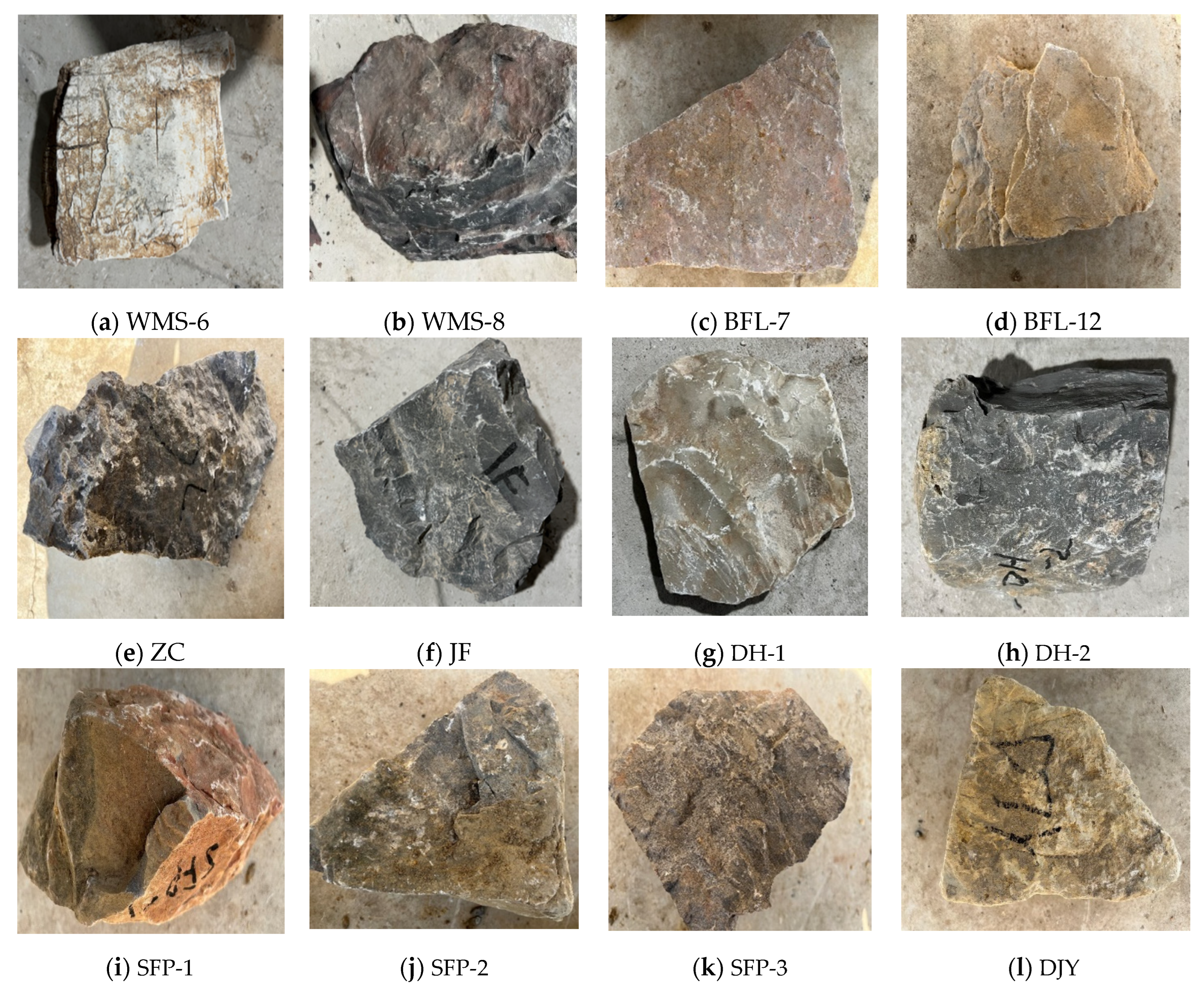
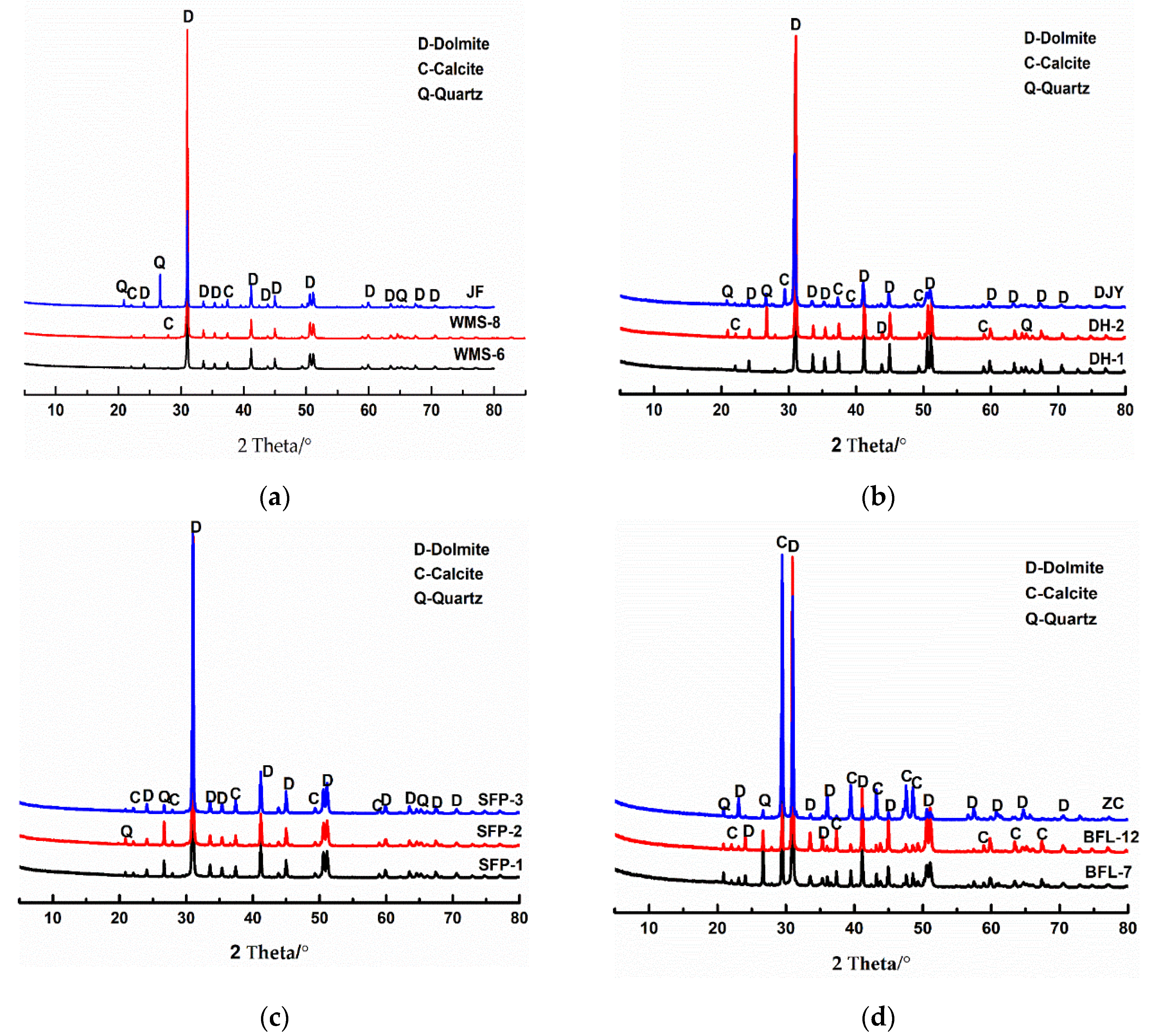




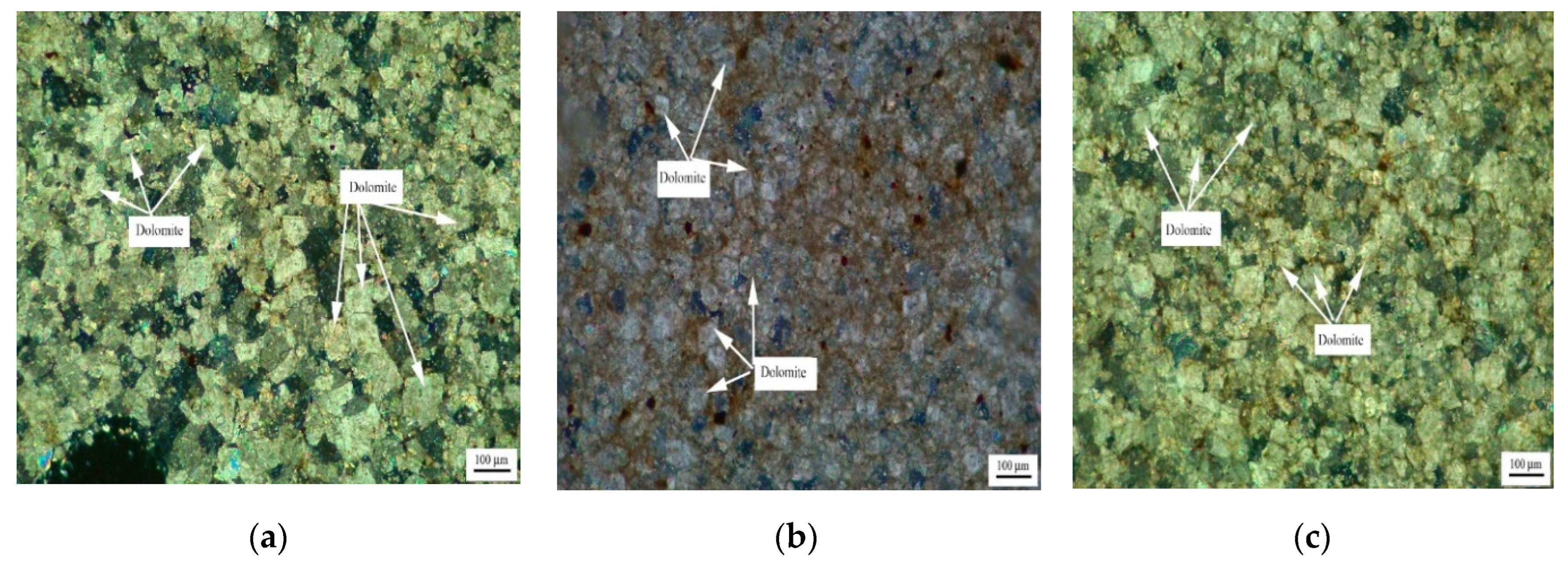

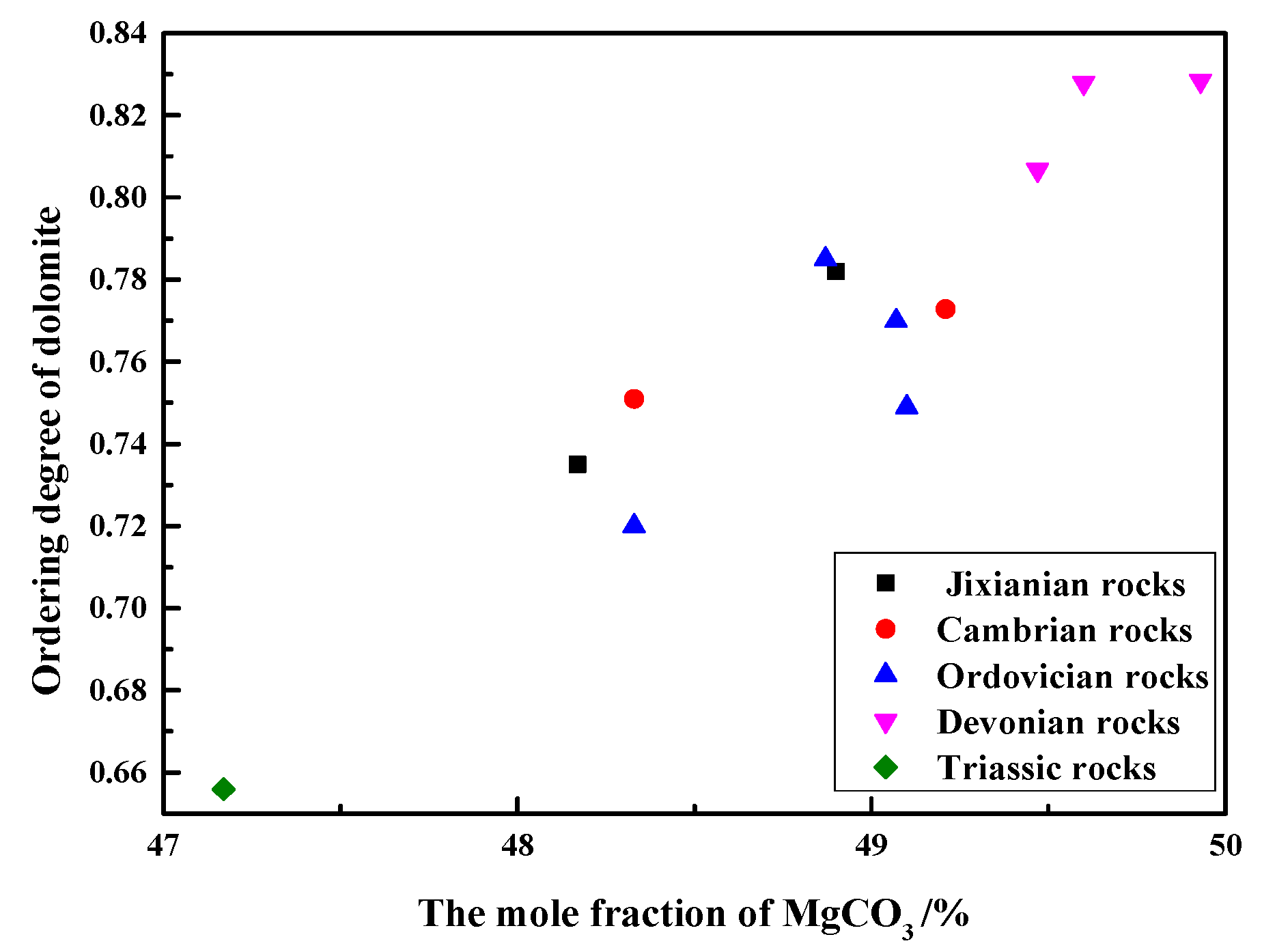
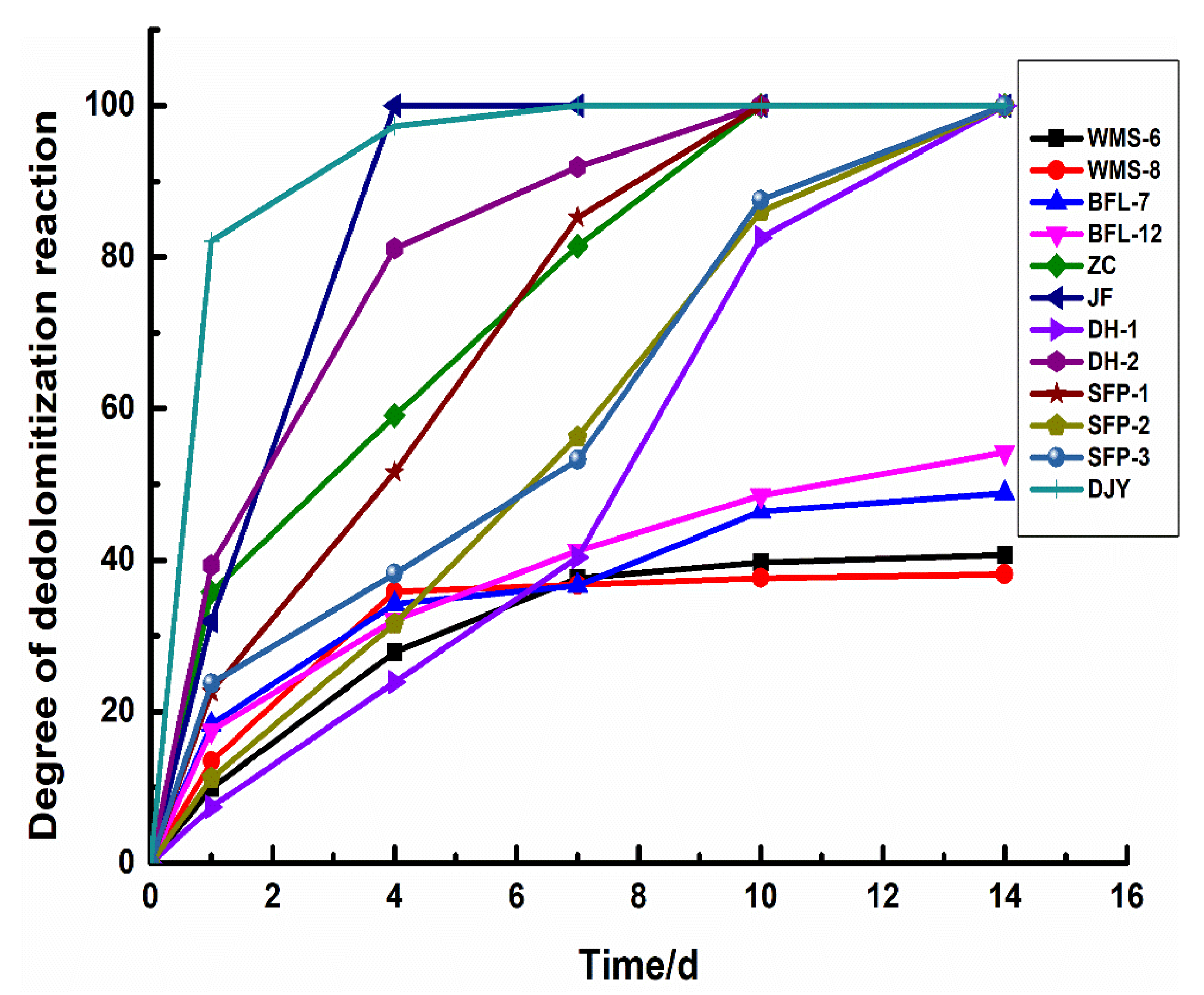
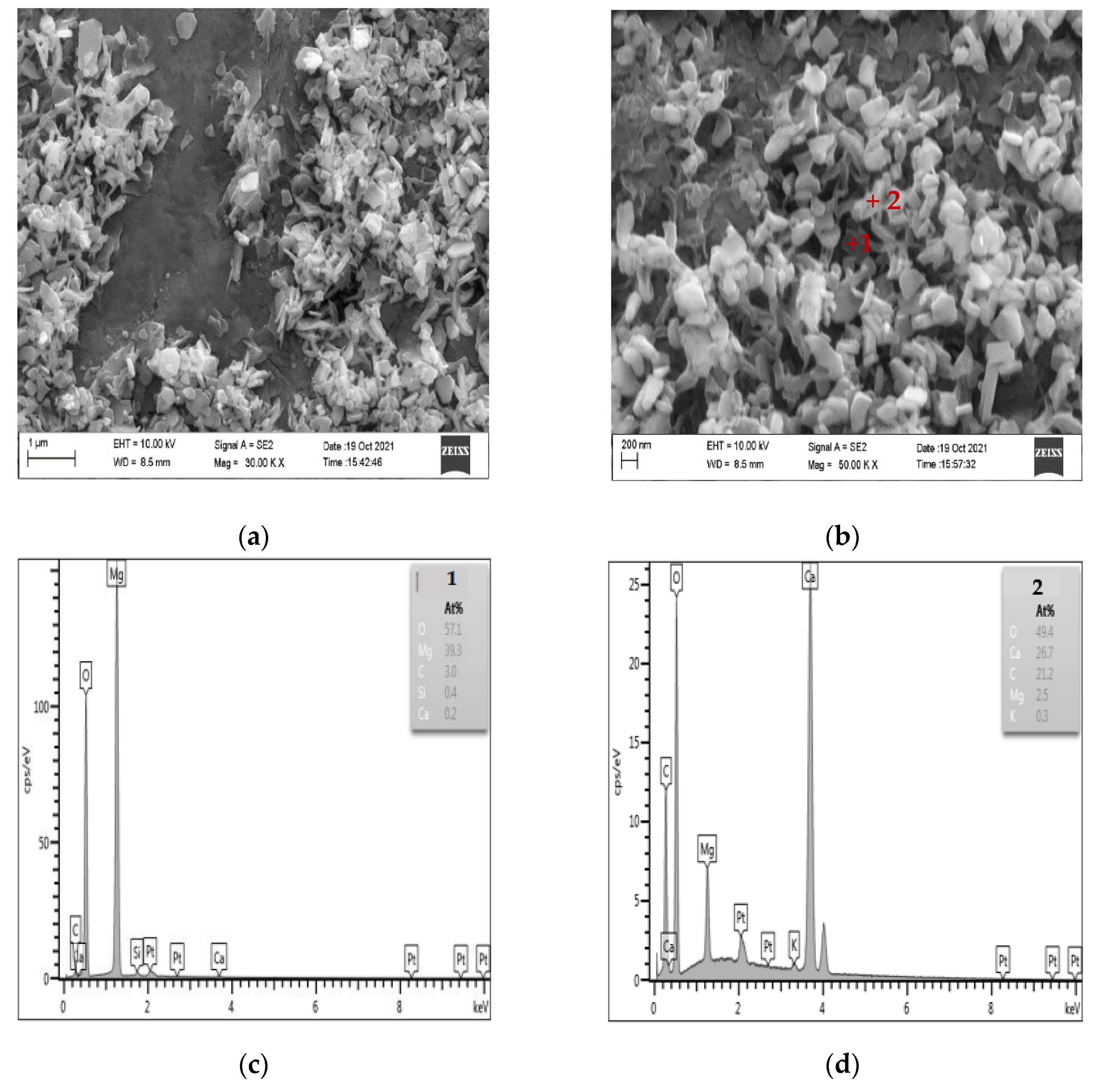
| Geological Age | Rocks | Chemical Composition/% | ||||||||
|---|---|---|---|---|---|---|---|---|---|---|
| SiO2 | CaO | MgO | Al2O3 | Fe2O3 | K2O | Na2O | Loss | Total | ||
| Jixianian | WMS-6 | 0.18 | 29.99 | 22.61 | 0.12 | 0.32 | 0.03 | 0.07 | 46.52 | 99.84 |
| WMS-8 | 6.16 | 26.56 | 19.77 | 0.41 | 1.22 | 0.03 | 0.07 | 45.48 | 99.70 | |
| Cambrian | BFL-7 | 2.68 | 44.04 | 4.81 | 0.50 | 0.22 | 0.08 | 0.12 | 47.11 | 99.56 |
| BFL-12 | 3.38 | 34.74 | 15.86 | 0.84 | 0.52 | 0.06 | 0.13 | 43.26 | 98.79 | |
| Ordovician | ZC | 2.38 | 47.03 | 5.13 | 0.24 | 0.33 | 0.13 | 0.18 | 43.56 | 98.58 |
| JF | 10.51 | 26.50 | 19.10 | 0.24 | 0.33 | 0.03 | 0.08 | 41.2 | 97.99 | |
| DH-1 | 0.63 | 29.13 | 21.85 | 0.24 | 0.33 | 0.04 | 0.04 | 46.11 | 98.37 | |
| DH-2 | 4.86 | 25.34 | 18.06 | 0.25 | 0.32 | 0.12 | 0.09 | 47.81 | 96.85 | |
| Devonian | SFP-1 | 3.83 | 28.38 | 20.53 | 0.25 | 0.50 | 0.09 | 0.11 | 44.28 | 97.97 |
| SFP-2 | 1.31 | 29.23 | 20.67 | 0.25 | 0.50 | 0.19 | 1.17 | 42.81 | 96.13 | |
| SFP-3 | 0.18 | 30.58 | 20.64 | 0.13 | 0.25 | 0.41 | 0.15 | 45.62 | 97.96 | |
| Triassic | DJY | 6.78 | 29.83 | 16.47 | 1.04 | 1.49 | 0.73 | 0.23 | 42.31 | 98.88 |
| Rocks | Geological Age | d (104) /Å | Ordering Degree I (015)/I (110) | Mole Fraction/ mol/% | |
|---|---|---|---|---|---|
| CaCO3 MgCO3 | |||||
| WMS-6 | Jixianian | 2.8915 ± 0.0532 | 0.7352 ± 0.0883 | 51.83 | 48.17 |
| WMS-8 | Jixianian | 2.8893 ± 0.0611 | 0.7821 ± 0.0774 | 51.10 | 48.90 |
| BFL-7 | Cambrian | 2.8910 ± 0.0722 | 0.7710 ± 0.1103 | 51.67 | 48.33 |
| BFL-12 | Cambrian | 2.8884 ± 0.0631 | 0.7528 ± 0.0757 | 50.79 | 49.21 |
| ZC | Ordovician | 2.8888 ± 0.1050 | 0.7694 ± 0.0934 | 50.93 | 49.07 |
| JF | Ordovician | 2.8910 ± 0.0611 | 0.7182 ± 0.1032 | 51.77 | 48.33 |
| DH-1 | Ordovician | 2.8894 | 0.7789 | 51.13 | 48.87 |
| DH-2 | Ordovician | 2.8887 ± 0.0933 | 0.7394 ± 0.0952 | 50.90 | 49.10 |
| SFP-1 | Devonian | 2.8876 | 0.8067 | 50.53 | 49.47 |
| SFP-2 | Devonian | 2.8862 ± 0.0612 | 0.8284 ± 0.0544 | 50.07 | 49.93 |
| SFP-3 | Devonian | 2.8872 ± 0.0403 | 0.8279 ± 0.0448 | 50.40 | 49.60 |
| DJY | Triassic | 2.8945 ± 0.0972 | 0.6059 ± 0.1176 | 52.83 | 47.17 |
| Rocks | The Ordering Degree of Dolomite | The Degree of Dedolomitization Reaction/% | |||
|---|---|---|---|---|---|
| 1 d | 4 d | 7 d | 14 d | ||
| WMS-6 | 0.74 | 9.92 | 27.86 | 37.66 | 40.66 |
| WMS-8 | 0.78 | 13.45 | 35.83 | 36.76 | 38.16 |
| BFL-7 | 0.77 | 18.34 | 34.25 | 36.67 | 48.88 |
| BFL-12 | 0.75 | 17.54 | 32.11 | 41.24 | 54.23 |
| ZC | 0.77 | 35.79 | 59.10 | 81.44 | 100.00 |
| JF | 0.72 | 31.94 | 78.00 | 100.00 | 100.00 |
| DH-1 | 0.78 | 7.44 | 23.92 | 40.39 | 100.00 |
| DH-2 | 0.74 | 39.34 | 81.15 | 91.92 | 100.00 |
| SFP-1 | 0.81 | 22.63 | 51.62 | 85.24 | 100.00 |
| SFP-2 | 0.83 | 11.21 | 31.61 | 56.28 | 100.00 |
| SFP-3 | 0.83 | 23.75 | 38.20 | 53.27 | 100.00 |
| DJY | 0.61 | 82.10 | 97.30 | 100.00 | 100.00 |
Publisher’s Note: MDPI stays neutral with regard to jurisdictional claims in published maps and institutional affiliations. |
© 2022 by the authors. Licensee MDPI, Basel, Switzerland. This article is an open access article distributed under the terms and conditions of the Creative Commons Attribution (CC BY) license (https://creativecommons.org/licenses/by/4.0/).
Share and Cite
Fan, Z.; Mao, Z.; Liu, X.; Yi, L.; Zhang, T.; Huang, X.; Deng, M. Microstructure of Dolostones of Different Geological Ages and Dedolomitization Reaction. Materials 2022, 15, 4109. https://doi.org/10.3390/ma15124109
Fan Z, Mao Z, Liu X, Yi L, Zhang T, Huang X, Deng M. Microstructure of Dolostones of Different Geological Ages and Dedolomitization Reaction. Materials. 2022; 15(12):4109. https://doi.org/10.3390/ma15124109
Chicago/Turabian StyleFan, Zhiyuan, Zhongyang Mao, Xiang Liu, Lei Yi, Tao Zhang, Xiaojun Huang, and Min Deng. 2022. "Microstructure of Dolostones of Different Geological Ages and Dedolomitization Reaction" Materials 15, no. 12: 4109. https://doi.org/10.3390/ma15124109
APA StyleFan, Z., Mao, Z., Liu, X., Yi, L., Zhang, T., Huang, X., & Deng, M. (2022). Microstructure of Dolostones of Different Geological Ages and Dedolomitization Reaction. Materials, 15(12), 4109. https://doi.org/10.3390/ma15124109





